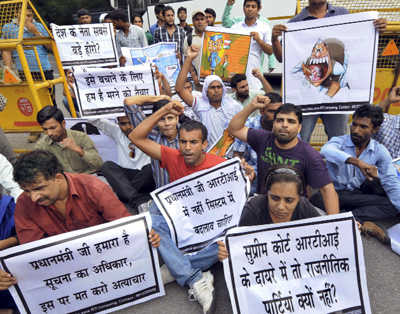
RTI activists protest outside the Prime Minister’s house in New Delhi. Political parties are subject to the law of the land. Tribune Photo
Objections by political parties notwithstanding it must be recalled that the RTI Act was passed unan
Jagdeep S. Chhokar
THE controversy about whether political parties can be put under the RTI or not has evoked a heated debate. Evenj those who support disclosure of finances of political parties are of the view that expecting political parties to make public details of in-house deliberations is asking for too much.
This arises out of objections raised by political parties consistently even during the hearings of this issue at the Central Information Commission (CIC), and now raised by the government of the day. It is important to make this distinction between the “government” on the one hand and “political parties” on the other. According to the Constitution, the “government” is formed by political party or parties. “Government” and “political parties” are neither synonymous nor interchangeable. Government functions on behalf of the nation whereas political parties function, presumably, on behalf of their membership.
Be that as it may, the PIL in the Supreme Court in which the government has submitted an affidavit, arises out of a decision by the CIC declaring six national political parties as public authorities under the RTI. A critical issue is: Why did the CIC do that?
But before that, let me state, in the spirit of full disclosure that I work with the organisation which is the first petitioner in the PIL in the Supreme Court and was also one of the applicants in the hearings in the CIC. The CIC was approached when political parties declined to entertain RTI applications, saying they were not public authorities under RTI. The request to the CIC was to declare political parties as public authorities. The CIC obviously asked why it should do so. This is where some background is necessary.
It must be remembered that the RTI Act was passed unanimously by the Parliament. It did not say which organisations, individually or by name, were or will be, public authorities. For example, it does not say that the Ministry of Railways, the Indian Oil Corporation, the Indian Olympic Association, and the Chandigarh Lawn Tennis Association are public authorities. Like most laws all over the world do, it provides a definition of public authority (in section 2(h) of the Act) which lists four requirements and says that “any authority or body” that satisfies or fulfils those requirements would be a public authority.
The applicants presented before the CIC information and evidence, collected painstakingly over a two-year period, by filing RTI applications to government bodies and getting responses to them, which convinced the CIC that six national political parties fulfilled the requirements for being declared as public authorities.
This information was also shared with the lawyers, leaders, and other representatives of political parties who attended the many hearings that were held with the CIC. Several objections, including those mentioned by the government in its affidavit, were raised during the hearings.After considering all of the above, the CIC decided to declare the six national political parties as public authorities under the RTI Act. It also gave detailed reasons in its 54-page decision announced on March 3, 2013. None of the six parties have challenged the decision of the CIC in the last two-and-a-half years in any court of law. For the government to say that being under the RTI would “hamper party functioning and mark an intrusion into confidential matters”, is strange to say the least. All public authorities, and there are tens of thousands of public authorities in the country, have been functioning since 2005 under the RTI. All of them deal with “confidential” issues. The RTI Act provides for exemptions in situations where disclosure of information is not necessary and can be denied. Section 8 of the RTI Act is precisely for this purpose. It is beyond understanding why political parties do not find this exemption satisfactory enough when tens of thousands of public authorities in the country have been functioning for 10 years without any difficulty.
It seems political parties want complete exemption from being under the RTI. The Act does have that provision in section 24 but, unfortunately for political parties, that section applies only to “intelligenceand security organisations specified in the Second Schedule.” It is hard to think of political parties as “intelligence and security organisations.”
The affidavit of the government also says that the CIC has made a “very liberal interpretation” of Section 2(h) of the RTI Act. A decision to declare a body to be a public authority, based on the fact that the conditions required to be satisfied to be a public authority are indeed satisfied, is in fact more of a “literal” interpretation of the law and is far from being a “very liberal interpretation.”
It is obviously for the Supreme Court to take the final view since the matter is sub judice, but the basic issue seems to be whether political parties, as an institution, are subject to the law of the land or are they special kind of organisations which are above and beyond the law of the land. So far, all Supreme Court decisions and Law Commission recommendations seem to suggest that laws of the land apply to every one and every body equally. Whether this will stay or change, only time and the Supreme Court, will tell.
The writer, former Professor, Dean and Director in charge of IIM Ahmedabad, is also the founding member of Association for Democratic Reforms and National Election Watch



























